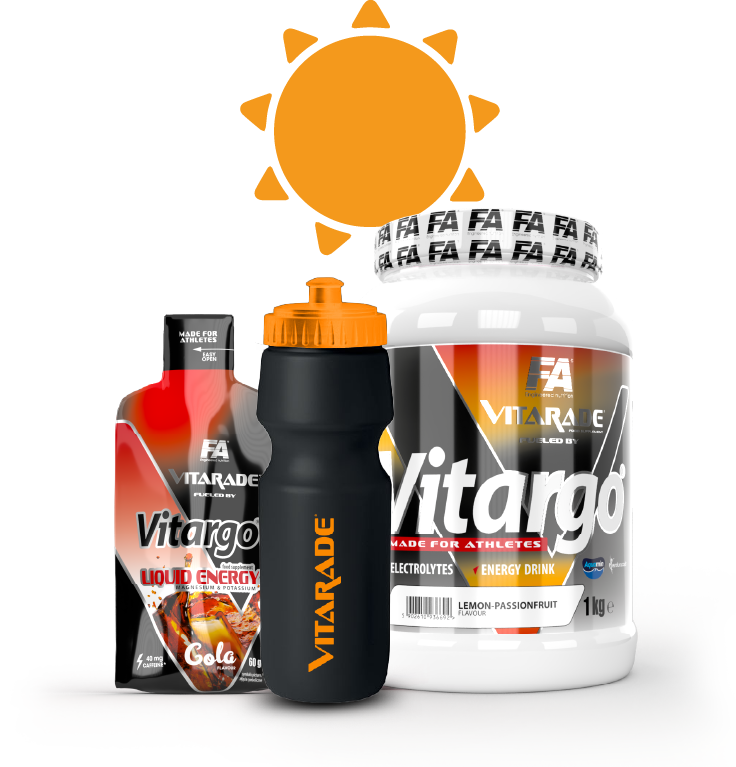Nutritional strategieS
At every stage, fuel your body with the right source of carbohydrates!

At every stage, fuel your body with the right source of carbohydrates!
The secret of successful athletes is to properly adjust nutrition to the conditions on the route.
Eat like a pro, using these basic guidelines:
- Don't wait for fatigue to set in. Plan your meals from the beginning according to a carefully designed strategy
- Eat a serving of carbohydrates before you start the race
- Eat solid foods such as bars or cookies when the pace is relaxed and the risk of intestinal distress is low
- When climbing long hills and before obstacles, nourish your body with gels and carbohydrate drinks
- At times when the competition gains momentum, it is worth helping the body with caffeine gel
- After exercise, try to regain adequate levels of hydration and energy with Vitarade® drink
Adapt nutrition to the weather conditions
When working out or competing in high temperatures, athletes should use isotonic drinks, which provide fluids, carbohydrates and electrolytes in proportions that ensure optimal hydration and energy delivery. Energy gels are recommended for intense and/or prolonged exercise. Use energy bars before a workout or during low-intensity exercise, as they are harder to digest.

When it IS cold, consume more gels solid foods

When it's hot, replenish carbohydrates with fluids and gels
| Vitarade® El – Powder | Vitargo® Liquid Energy | Vitarade® Endurance Bar | |
|---|---|---|---|
| Carbohydrate amount | 50 g | 25 g | 38,5 g |
| Volume | 500 ml | 60 g | 60 g |
| Form | liquid | gel | solid |
| Additional benefits | hydration, source of electrolytes | contains caffeine | satisfies hunger |
It is quantity that counts
Adjust the amount of carbohydrates consumed according to the type of exercise and your own body’s tolerance.
30 g/h
light exercise
No intestinal adjustment period required
60 g/h
Moderate exercise
It’s advisable to test the strategy in conditions similar to the competition situation
90 g/h
Many hours of intense exercise
Necessary testing of feeding strategies and training your gut to tolerate ingestion of food during exercise.
Light exercise – any physical exertion causes involuntary consumption of energy substrates. If you don’t want to “hit the wall” make a proper nutritional plan. A safe and well-tolerated amount for any amateur exercise enthusiast is 30 grams of carbohydrates per hour.
Moderate exercise – the rate of using up of glycogen stores (sugar stored by muscles and liver) by athletes depends on the intensity of physical effort. The value tolerated by most people is 60 g of carbohydrates per hour. It’s advisable to test this strategy in training conditions.
Many hours of intense exercise – athletes competing at the top level try to consume as much as 90-100 grams of carbohydrates during each hour of athletic competition. This strategy requires the intestines to get used to digest (“Gut training”) such amounts of food under conditions of physical exertion



